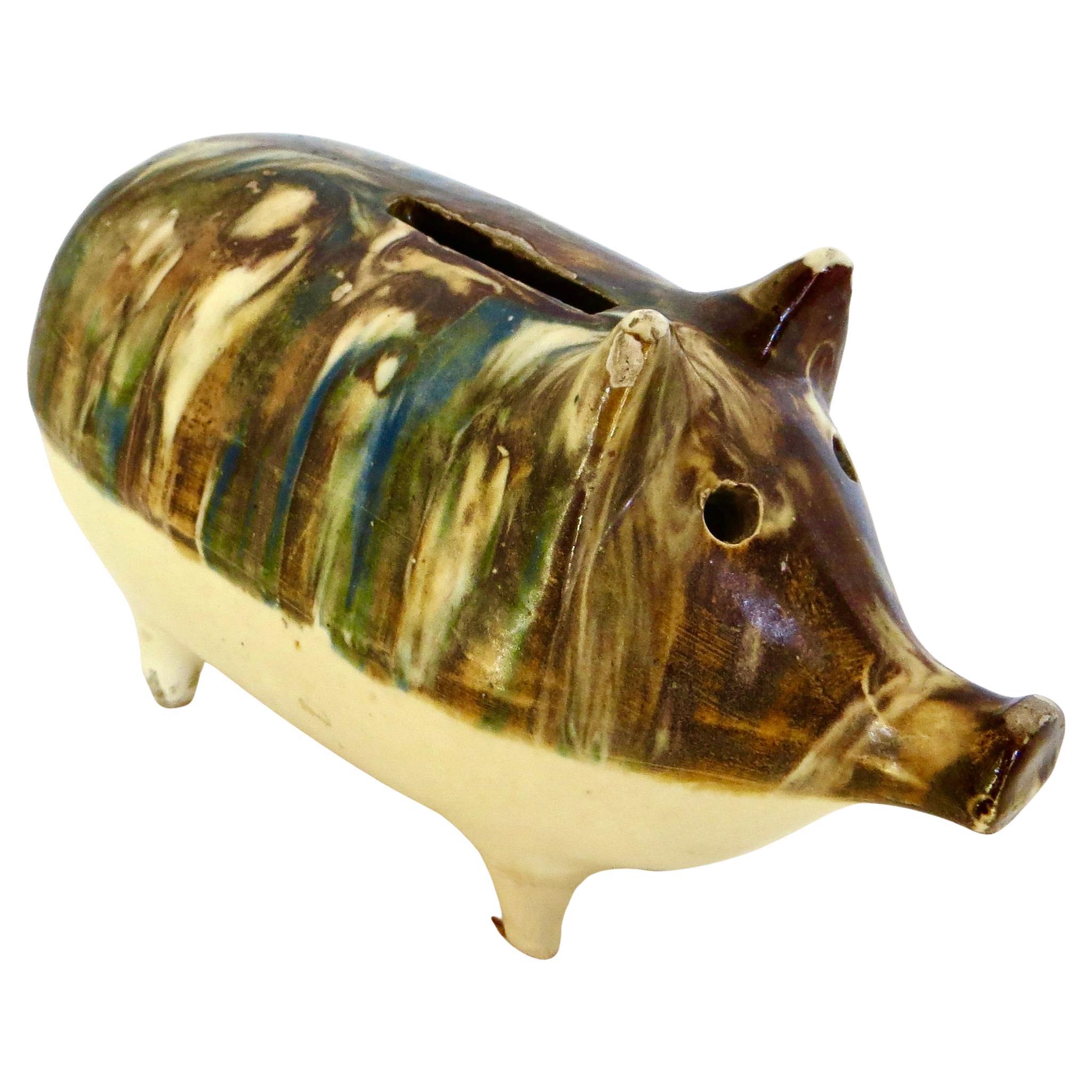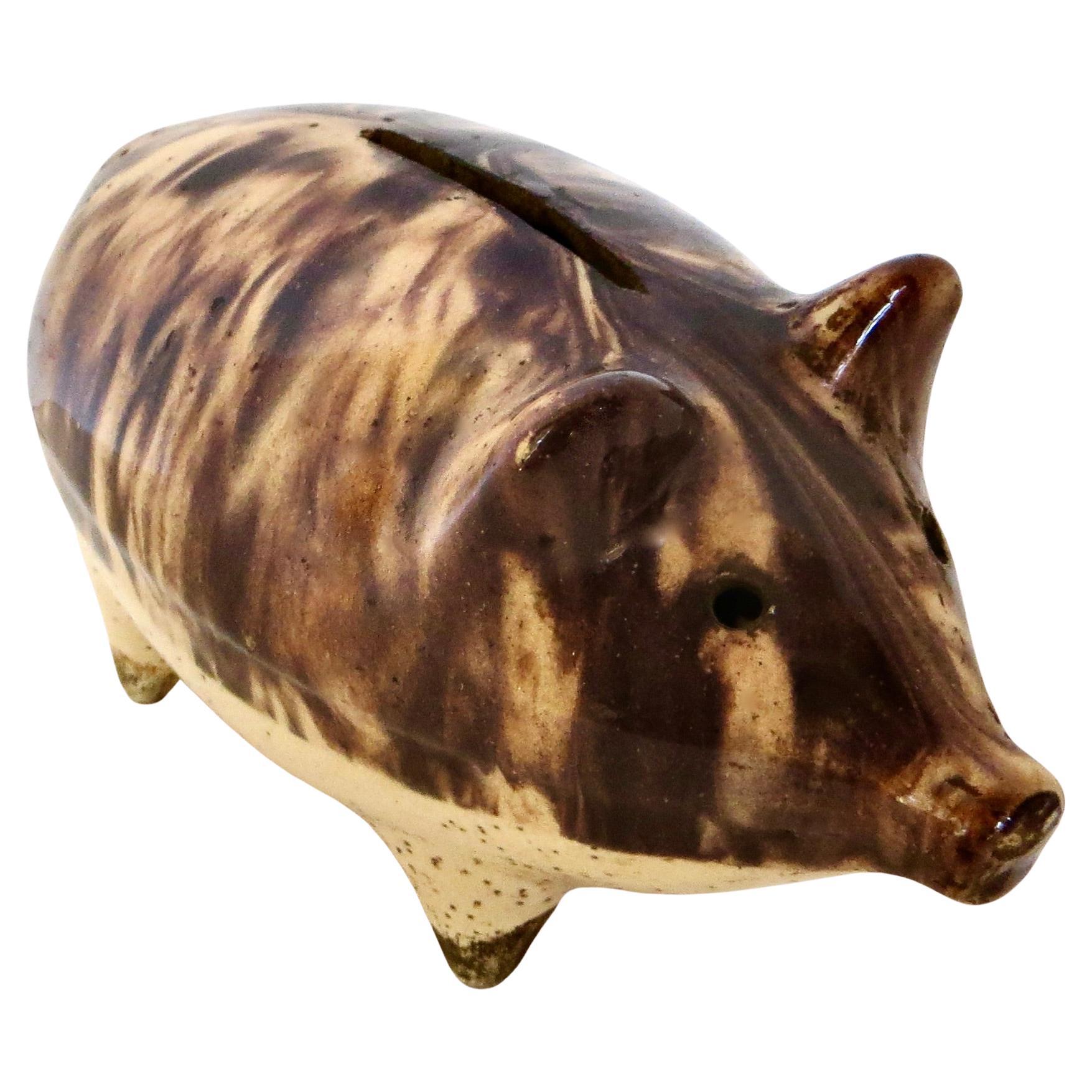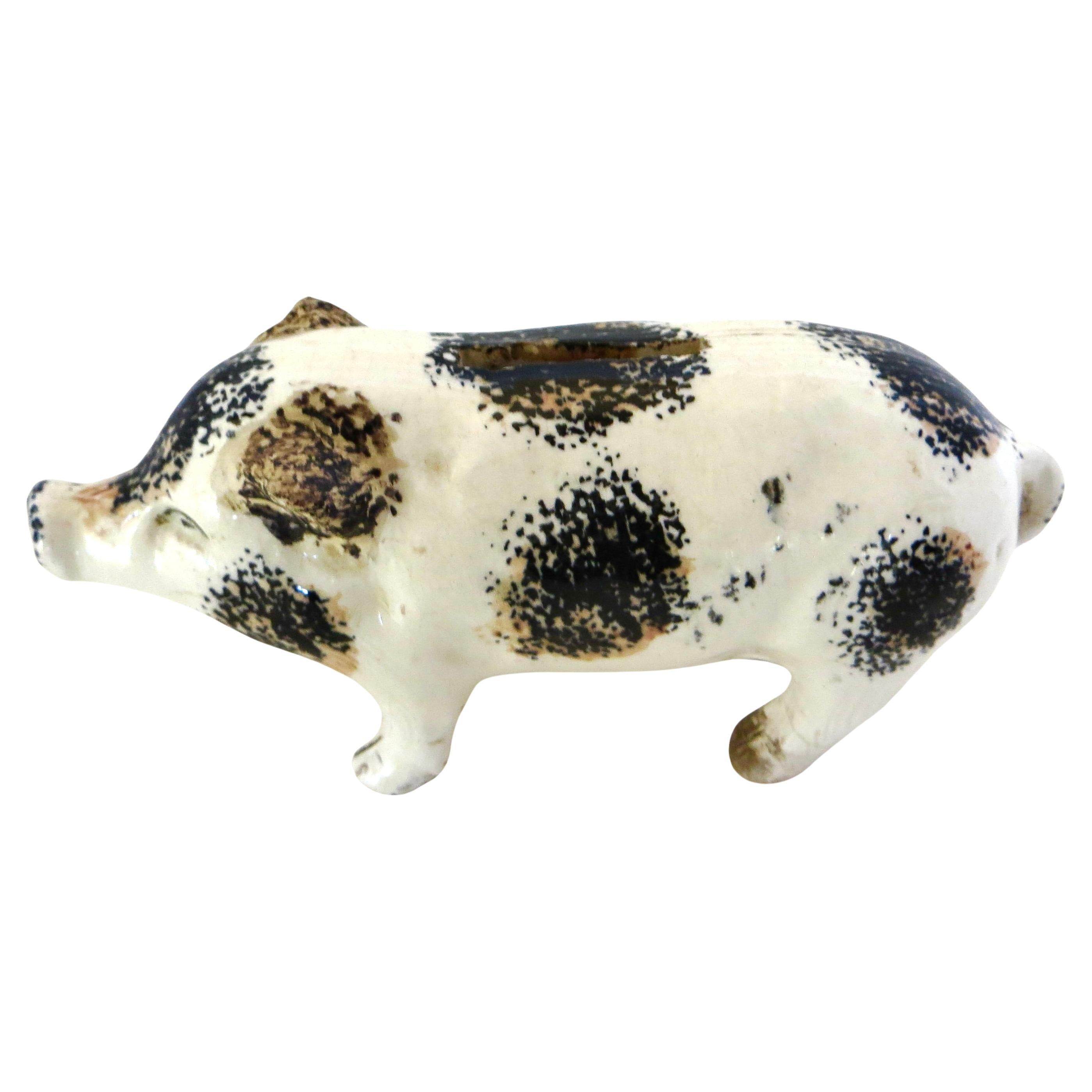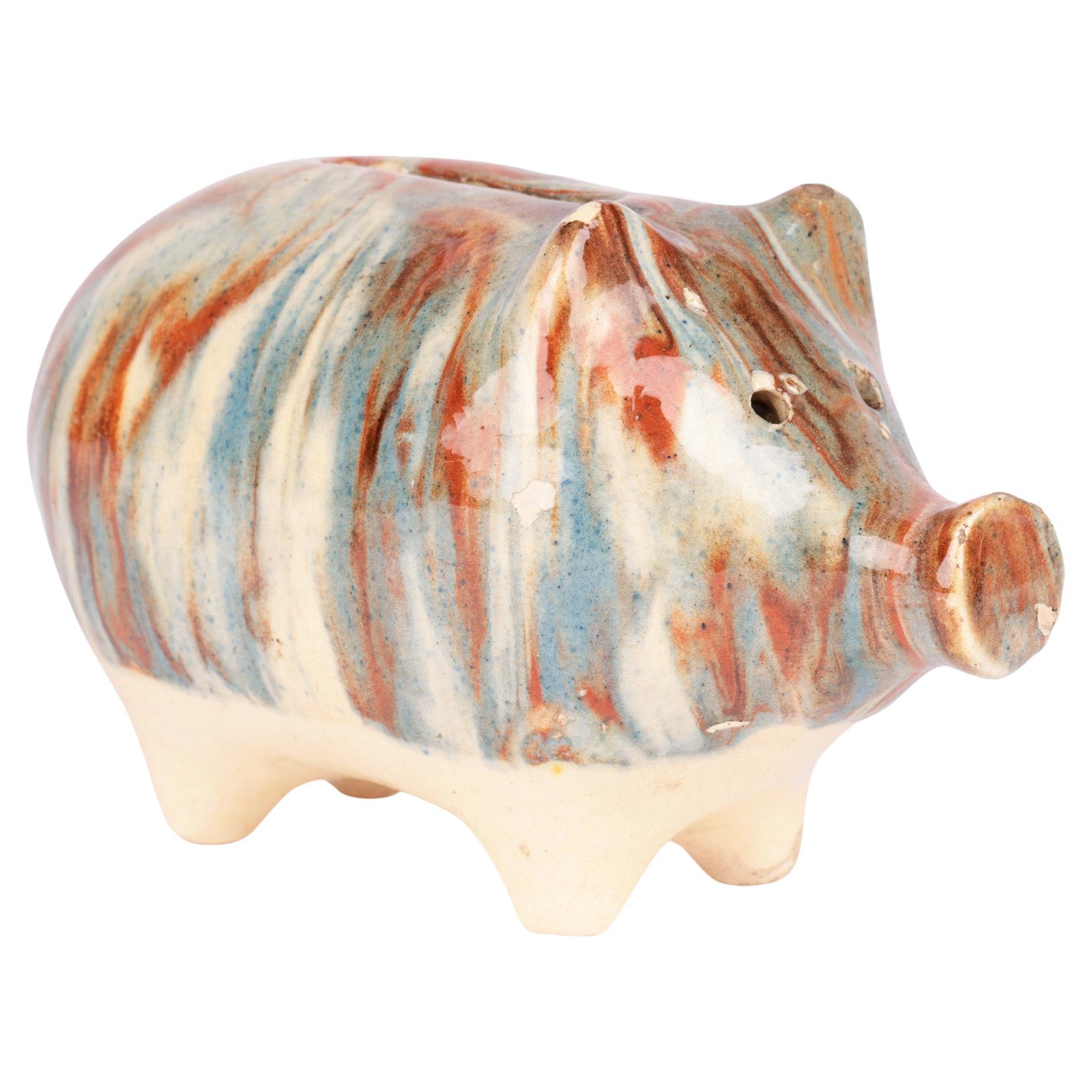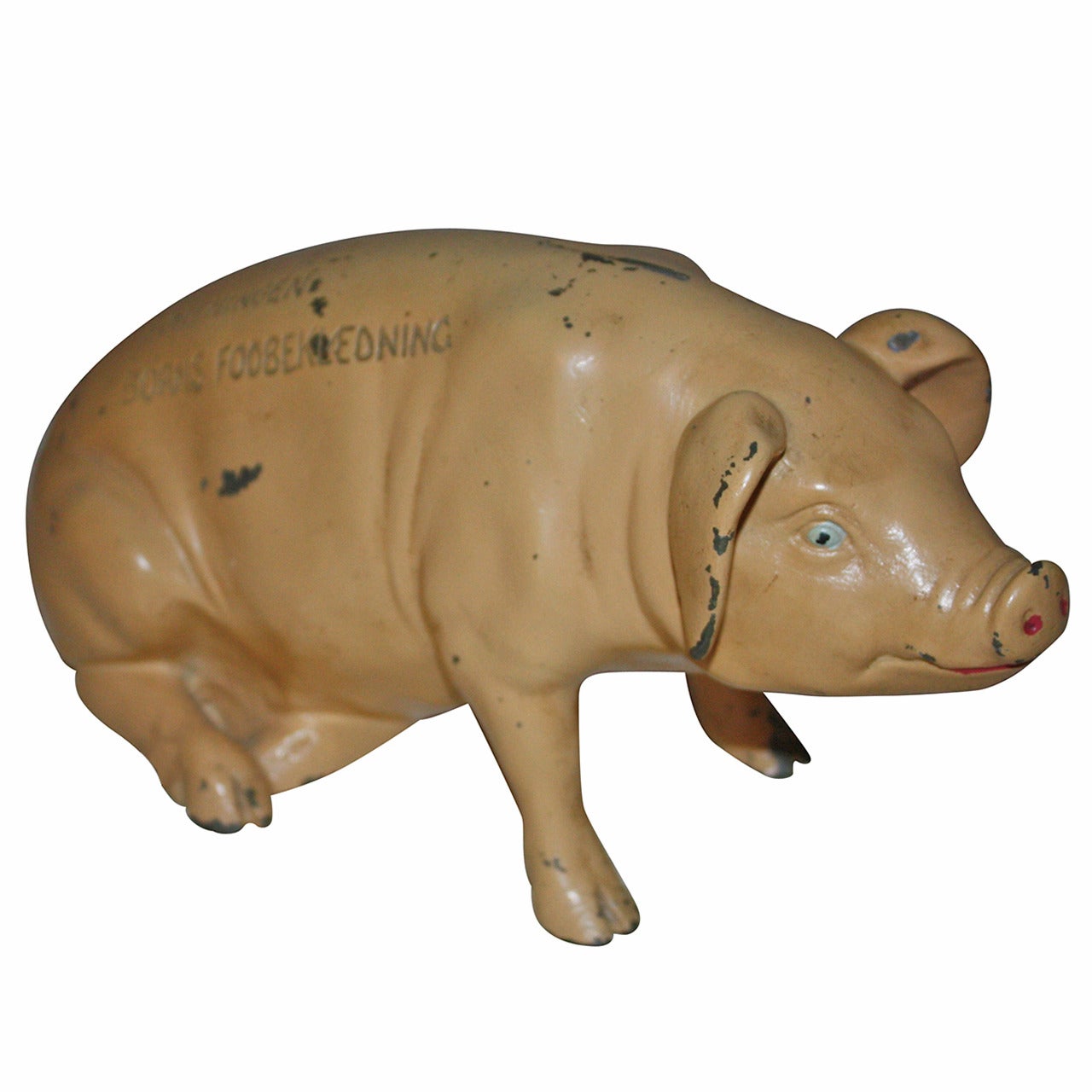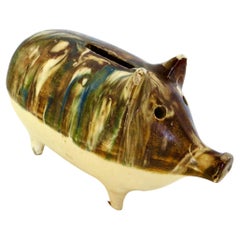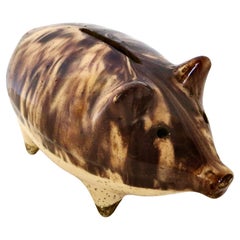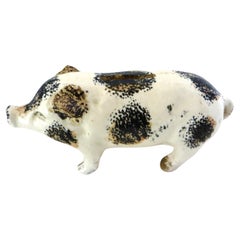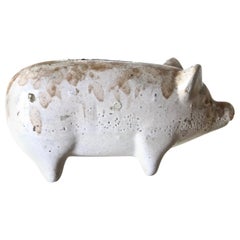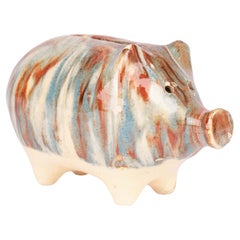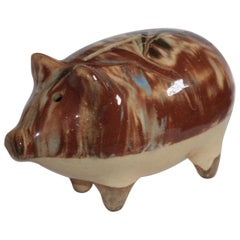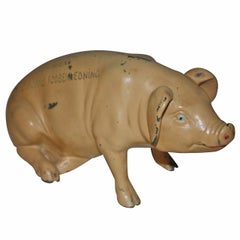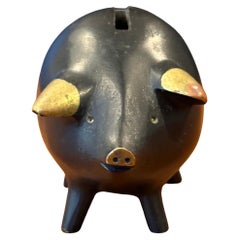Items Similar to Early 20thC American Stoneware Razor Blade Disposal Piggy Bank Circa 1905
Want more images or videos?
Request additional images or videos from the seller
1 of 8
Early 20thC American Stoneware Razor Blade Disposal Piggy Bank Circa 1905
$385
£290.74
€332.87
CA$543.72
A$593.61
CHF 311.21
MX$7,209.66
NOK 3,886.47
SEK 3,669.86
DKK 2,484.50
About the Item
This is a very unique and rare item and quite collectible in that the primary purpose of the bank was to provide a safe method to dispose of used razor blades at the turn of the 19th to 20th century to prevent accidental cuts or injuries; and, was purposely made with no provision to "reuse" so, in essence, the razor blade bank, once filled, was discarded, thus making existing examples almost impossible to come by and even when found unused for blades they were typically damaged due to their pottery manufacture and, in some cases, utilized as piggy banks by children and thus mishandled.
King Camp Gillette invented the two sided razor blade in 1901 so there was an immediate need for the practical disposal of dull razor blades.
This particular example is an American stoneware bank with the ubiquitous pig theme; the pig is standing on all fours with a wider than usual belly and a flat snout; nicely hand painted in white background and green leaves, with brown ears, snout and mouth, then glazed, resulting in a beautiful all original surface and patina. The bank is in very good all original condition with no restoration, touch-up paint or repaint of any kind. The top mounted slot receptacle is slightly wider than would be for a coin (unless made for the European market) and is appropriately chipped; that factor along with the wonderful crazing to the finish is indicative of 125 year old genesis. There is some kind of non-discernible gold mark to the right side of the pig (see images). The tail is chipped but there are no other flaws. I suspect it very well could have been, and at some time was, used as a still bank, consequently this would make a great addition for still bank collectors as well as both American folk art aficionados, and pig collectors.
Dimensions: 4 1/2" long x 3" wide x 3 3/8" high
Provenance: Recently acquired in a collection of pig banks from an estate sale
Note: I am a leading specialist in the field of antique banks, having been buying, selling, and examining these fine objects for 40 years. This experience makes me well qualified to analyze, evaluate, and warrant the authenticity of original examples. I guarantee the banks that I have listed to be as I have described them. I have examined under 10 power loop and note the mini crazing indicative of 19th century manufacture.
Note: Please see my other bank listings I am offering for sale.
- Dimensions:Height: 3.38 in (8.59 cm)Width: 3 in (7.62 cm)Depth: 4.5 in (11.43 cm)
- Style:Folk Art (Of the Period)
- Materials and Techniques:
- Place of Origin:
- Period:1900-1909
- Date of Manufacture:Circa 1905
- Condition:Wear consistent with age and use.
- Seller Location:Incline Village, NV
- Reference Number:1stDibs: LU973245551652
About the Seller
5.0
Recognized Seller
These prestigious sellers are industry leaders and represent the highest echelon for item quality and design.
Platinum Seller
Premium sellers with a 4.7+ rating and 24-hour response times
Established in 1976
1stDibs seller since 2013
282 sales on 1stDibs
Typical response time: 2 hours
Associations
Art Dealers Association of America
- ShippingRetrieving quote...Shipping from: Incline Village, NV
- Return Policy
Authenticity Guarantee
In the unlikely event there’s an issue with an item’s authenticity, contact us within 1 year for a full refund. DetailsMoney-Back Guarantee
If your item is not as described, is damaged in transit, or does not arrive, contact us within 7 days for a full refund. Details24-Hour Cancellation
You have a 24-hour grace period in which to reconsider your purchase, with no questions asked.Vetted Professional Sellers
Our world-class sellers must adhere to strict standards for service and quality, maintaining the integrity of our listings.Price-Match Guarantee
If you find that a seller listed the same item for a lower price elsewhere, we’ll match it.Trusted Global Delivery
Our best-in-class carrier network provides specialized shipping options worldwide, including custom delivery.More From This Seller
View AllVintage Stoneware Larger Size Multi-Colored Pig Bank (Still Bank) Austria C1890
Located in Incline Village, NV
This bank was manufactured by HEPP "The Hole-Eyed Pottery Pig" company, the oldest Czechoslovakian/Austrian ceramic coin bank manufacturer, circa 1890. Their best customer was the Un...
Category
Antique 1890s Austrian Folk Art Toys
Materials
Stoneware
Multi Colored Brown & Beige 19thC Stoneware Large Size Pig Bank Austria Ca 1890
Located in Incline Village, NV
A marbleized brown with a beige hand painted underbelly dominates the color scheme to this excellent condition 19th century authentic stoneware Austrian still bank. This "piggy" bank...
Category
Antique 1890s Austrian Folk Art Toys
Materials
Stoneware
19th C. Stoneware Children's Savings Pig Bank. England, Circa 1880
Located in Incline Village, NV
In the late 19th century the concept of thrift became a principle by which parents encouraged their children to safe money by putting their pennies into a "piggy bank", thus the proliferation of these items by pottery manufacturers, this particular example marked "SS" on the underneath indicating "A Smith Ltd.", Longton, England whose ceramic, china, and pottery business began in 1846 by Sampson Smith.
Nicely molded and in excellent condition, this proverbial pig themed penny bank is painted overall white with a multiplicity of green "spatter" spots, the pig standing on all fours has a twisted tail in back. The original finish is beautifully glazed resulting in a lovely patina to this completely original bank with no restoration or touch up paint of any kind and all of it's original hand paint intact.
Since these type of antique banks typically were made without a coin removal trap, the only way to extract the coins would have been the old "knife in the slot" method and retrieving the pennies one by one; or the more simpler method of smashing and breaking the bank, which is why locating these banks is very difficult, rendering a fine example particularly rare.
This example is a wonderful addition to a collection of authentic still banks, folk art, or for those who accumulate pig items. This recently came from an estate collection of pig still banks. A similar example is referenced as #633 "Two Toned Pig" in Andy Moore's "The Penny Bank Book" written in 1984 when collecting pottery banks...
Category
Antique 1880s English Folk Art Toys
Materials
Stoneware
American Pottery Pig Bank, Circa 1880's
Located in Incline Village, NV
American pottery still bank in the shape of a pig, used for saving coins (usually pennies) to encourage children the importance of thrift. Pottery still banks are somewhat scarce since the typical way to remove coins was to smash the bank open, albeit, with this particular example, perhaps a knife was used for coin removal (note the wear to the coin slot---see images) or perhaps the additional wear is also from many coins having been deposited.
The bank is in good all original condition , from an unknown potter (unmarked) circa 1880's, and probably a variant of #633 "Two Toned Pig" in Andy Moore's "The Penny Bank Book" written in 1984 when collecting pottery banks...
Category
Antique 1880s American Folk Art Toys
Materials
Pottery
Vintage Children's Toy Savings Bank "U.S. Mail". American, Circa 1920
By A.C. Williams Company
Located in Incline Village, NV
Children's Savings Coin Bank "U.S. Mail" bank , also known as a "still bank"; was American made, circa 1920. This is well made, sturdy, and all original. It is made of cast iron and hand painted in original green paint with gold highlighting. There is no repaint and no restoration.
The coins were deposited through the "letter depository"; lift the lever and drop in a coin (see image). When the bank is full, coins are removed by undoing the original square nut in back and the screw in front. Cast into two parts and now separated, the coins are easily collected. Put back together again to insure parts don't go missing (which happened often) and original screw and nut are maintained.
This bank was manufactured circa 1920 by the A.C. Williams Company, Chagrin Falls, Ohio. They made many cast iron toys, banks and other products during their time of operation until World War II.
The "U.S. Mail" bank is referenced on page 102 #853 in "The Penny Bank Book" by Andy and Susan Moore...
Category
Early 20th Century American Folk Art Toys and Dolls
Materials
Iron
"Toby" Jug Still Bank and Biscuit Tin, circa 1910
Located in Incline Village, NV
This is both a still bank and a biscuit tin. It would originally have been sold, filled with biscuits. After all of the cookies would have been consumed, the tin (rather than been thrown away) would have been used as a bank to save money. There is a slot for deposits at the back of the neck at the top (see image). Coins would have been removed by lifting or twisting the snug fitting lid. Toby is nicely hand-painted in pleasing colors of green, blue, gold, and white, with realistic flesh tones to the hands and face. The total height is 6 1/2" while the total width is 6" (includes handle). Diameter at the base is 5".
This Toby figured tin was manufactured circa 1911 by the biscuit tin company of Hudson Scott located in Carlisle, England.
It is marked at the bottom "Hudson Scott & Sons Ltd. Carlisle, England."
It has crossover appeal into three categories of collectors. It would be a welcome addition to both the still bank collector and the biscuit tin collector...
Category
Vintage 1910s English Folk Art Toys
Materials
Tin
You May Also Like
Staffordshire Marble Slipware Glazed Pottery Pig Moneybox
Located in Bishop's Stortford, Hertfordshire
A delightful antique English Staffordshire pottery pig moneybox decorated in marble effect slipware glazes and dating from around 1840. The moneybox shaped as...
Category
Antique 1840s English Early Victorian Models and Miniatures
Materials
Pottery
19Thc Marbleized Stone Ware Piggy Bank
Located in Los Angeles, CA
This is a very early stone ware glazed piggy bank from New England. This is a handmade piggy bank in very good condition.
Category
Antique 1870s American Folk Art Porcelain
Materials
Pottery
Danish Piggy Bank for Charity, circa 1920s
Located in Copenhagen, K
Lovely piggy bank with inscription aiming to collect money for the society for children’s footwear. This union was established in 1889 and was still active in mid-1930s.
Category
Vintage 1910s Danish Folk Art Animal Sculptures
Materials
Iron
Small Modernist Cast Iron Piggy Bank by Taxco of Mexico
By Taxco
Located in San Diego, CA
Small modernist cast iron piggy bank by Taxco of Mexico, circa 1970s. The piece measures 2"W x 4"D x 2.5"H and is in very good vintage condition. ...
Category
Mid-20th Century Mexican Mid-Century Modern Animal Sculptures
Materials
Iron
Danish Midcentury Stoneware Money Piggy Bank by Per Steffen Petersen, 1970s
Located in Esbjerg, DK
A chubby and unusual Money bank pig executed in glazed studio stoneware. A unique design by the Danish ceramist Per Steffen Petersen who from the 1940s onwards worked at Kähler in De...
Category
Vintage 1970s Danish Mid-Century Modern Animal Sculptures
Materials
Stoneware
$268 Sale Price
20% Off
Cast Iron Piggy Bank Advertising Wm Moland's Sons Quaker City Hams
Located in Godshill, Isle of Wight
Cast Iron Piggy Bank Advertising Wm Moland's Sons Quaker City Hams
A Great cast iron money box, Pig coin bank.
This a copy of a very desirable and collect...
Category
Vintage 1950s Folk Art Models and Miniatures
Materials
Iron
